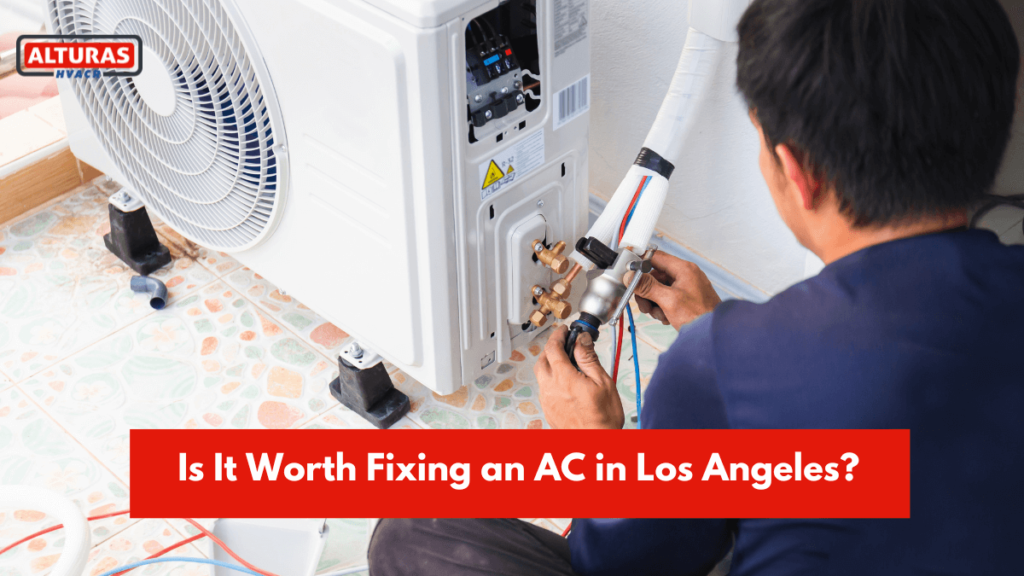If your air conditioner breaks down in Los Angeles, you might wonder if it’s worth fixing or if replacing it makes more sense. Given the high temperatures during summer, air conditioning is essential for comfort, especially during peak heatwaves. The decision to repair or replace depends on several factors, including the age of your unit, the cost of repairs, and energy efficiency concerns. This article will break down everything you need to know, helping you make an informed decision about whether is it worth fixing an AC in Los Angeles.
Contact for Commercial Air Conditioning Repair Los Angeles
10 Reasons Why It’s Worth Fixing an AC in Los Angeles
1. Los Angeles Climate
Los Angeles has a hot Mediterranean climate, which means summers are long and hot, often reaching uncomfortable levels. Without a functioning AC, staying comfortable in your home can be challenging and lead to health risks, especially for vulnerable people. Repairing your AC can restore comfort quickly, especially during peak summer months when temperatures rise above 90°F and nights remain warm.
Helpful for you: Impact of Climate Change on HVAC Systems in Los Angeles
2. Cost-Effective in the Short Term
Repairs are generally more affordable than purchasing a new unit, especially if your current system is relatively new or in good condition. If your AC is still performing well and the repair costs are reasonable, it may make more sense to fix it than to invest in a brand-new unit, which comes with higher upfront costs and possible installation fees.
3. Energy Efficiency Improvements
Many AC problems, such as refrigerant leaks or dirty coils, can cause your unit to run less efficiently, leading to higher energy consumption. By repairing these issues, your AC will use less energy to cool your home, which can lower your utility bills and reduce your carbon footprint. Regular maintenance and prompt repairs help ensure your system runs as efficiently as possible.
Also Read: Why is My AC Running but Not Cooling?
4. Longevity of the Unit
Most air conditioning units have a lifespan of 10 to 15 years, depending on maintenance and usage patterns. If your AC is less than 10 years old, fixing it is usually a more cost-effective option, as it can extend the unit’s life and help avoid the need for a costly replacement. Proper care can add several more years to the life of your system.
5. Avoid High Installation Costs
Replacing an AC unit in Los Angeles comes with significant installation costs, especially when upgrading to newer models. By opting for a repair, you can avoid these added expenses and keep your existing system running smoothly. Installation also takes time, and repairs can be done quickly in comparison, restoring comfort without a long wait.
6. Environmental Impact
By repairing your AC, you are helping to reduce waste, which is beneficial for the environment. Replacing a unit adds to landfill waste and increases the energy used in manufacturing new units, making repairs the more environmentally friendly option. Opting for repairs reduces your ecological footprint while still ensuring your home stays cool and comfortable.
You May Also Like: Common Causes of Commercial AC Breakdowns in Los Angeles
7. Availability of Parts
For many AC models, replacement parts are readily available and can be installed quickly by a professional technician. If your system only requires a minor fix like a fan motor or capacitor replacement, it’s often quick and easy to repair the unit without waiting for long lead times on parts. This ensures minimal downtime and disruption to your home’s cooling.
8. Personalized Comfort Settings
If your current AC has features like programmable thermostats or zoning that you rely on for specific comfort needs, a repair might be a better option. Upgrading to a new system could mean losing these customized settings or paying extra to match them in the new system. Maintaining your existing unit allows you to keep the comfort controls that suit your lifestyle.
9. Minimal Disruption
Repairing your AC typically involves less disruption to your daily life than installing a new system, which can take several days. A quick fix can have your home cool again within a few hours, while a replacement could take a full day or more to complete. This is especially important during heatwaves when fast service is crucial for maintaining a comfortable home environment.
10. Warranty Considerations
If your AC is under warranty, the cost of repairs may be partially or fully covered by the manufacturer. Always check the terms of your warranty before deciding to replace your unit, as repair might be the more affordable option. Replacing a unit that’s still under warranty may lead to unnecessary expenses that could have been avoided by opting for repairs.
Must Read: How to Find the Best AC Installation Service in Los Angeles
When to Replace Instead of Repairing in Los Angeles
While fixing an AC can be a good option in many cases, there are certain factors that may suggest replacing your unit is the better choice for long-term cost savings and efficiency.
1. Age of the Unit
If your AC is over 10-15 years old, it may be time to consider a replacement, as older systems become less energy-efficient and more prone to frequent breakdowns. Investing in a new system can provide better performance and peace of mind, knowing that your AC is less likely to fail during critical times. Modern units offer energy savings that can quickly offset the initial cost.
2. Frequent Breakdowns
If you’ve had to repair your AC multiple times in the past few years, it might be more cost-effective to replace it. Constant breakdowns are often a sign that the unit is nearing the end of its lifespan, and ongoing repairs can become a financial burden. Replacing the system can save you money in the long term and ensure reliable performance.
3. High Repair Costs
A good rule of thumb is the 50% rule: if the cost of repairing the unit exceeds 50% of the price of a new system, replacing the AC makes more financial sense. Large issues like a failing compressor or major electrical failures can be expensive to fix, making a new unit a more practical investment in the long run.
4. Rising Energy Bills
Older AC units are generally less energy-efficient than modern systems, leading to higher monthly energy bills. If your energy costs have been steadily rising despite regular maintenance, a new, more efficient unit could save you money in the long run by reducing energy consumption. Newer systems are built to meet higher energy efficiency standards.
5. Newer Technology
Air conditioning technology has advanced significantly in recent years, offering better energy efficiency and enhanced features. If your system is outdated, upgrading to a new unit with smart thermostats, zoning, or energy-efficient features may provide better comfort and savings. These advancements can also improve indoor air quality and offer remote access controls for easier management.
Get Help from: Top HVAC Companies in Los Angeles
Also Read: Should I Repair Or Replace AC unit?
Conclusion
Deciding whether to fix or replace your AC in Los Angeles can be a tough choice, but with the right information, you can make a decision that balances cost, energy efficiency, and comfort. If your system is still relatively new, hasn’t had frequent repairs, and the cost of fixing it is reasonable, a repair may be the best option. However, if your unit is old, inefficient, and prone to breakdowns, replacing it with a newer model can save you money and headaches in the long term. The key is to weigh the costs and benefits based on your specific situation, ensuring you make the choice that fits your needs.
Is It Worth Fixing an AC in Los Angeles FAQs
1. How long does an AC unit typically last?
Most AC units last between 10 and 15 years, depending on how well they are maintained and how frequently they are used. Regular maintenance can help extend the lifespan of your system.
2. What is the most common reason for AC breakdowns?
The most common causes of AC failures include refrigerant leaks, dirty coils, and failing compressors. Regular maintenance and timely repairs can prevent these issues from becoming major problems.
3. Is it more cost-effective to repair or replace an old AC?
It depends on the extent of the damage and the unit’s age. Generally, if the repair costs exceed 50% of the price of a new AC, it’s better to replace it. Long-term energy savings from a new unit can also influence the decision.
4. How can I improve my AC’s energy efficiency?
Regular maintenance, such as cleaning the filters and coils, and upgrading to a programmable thermostat can improve efficiency. Sealing windows and doors also helps keep cooled air inside your home.
5. What should I do if my AC stops working during a heatwave?
Call a professional HVAC technician immediately. In Los Angeles, many companies offer emergency services to handle urgent situations during extreme weather. Using fans and closing blinds can help keep your home cooler until repairs are completed.

